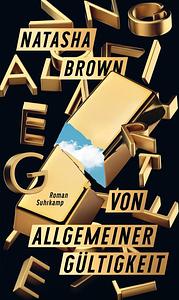Take a photo of a barcode or cover
Audiobook is excellently done. The story itself, however, felt underdeveloped and underwhelming. I enjoyed it as a commentary on modern media and political representation within in, but the story didn’t quite deliver the punchline as strongly as it could have, which made it a little bit lacklustre.
adventurous
challenging
dark
reflective
sad
medium-paced
Plot or Character Driven:
Plot
Strong character development:
No
Loveable characters:
No
Diverse cast of characters:
Complicated
Flaws of characters a main focus:
Complicated
Universality
Natasha Brown’s Universality is a satirical novel that opens with a viral exposé of an illegal lockdown rave, then fragments into competing perspectives that deliberately blur the lines between truth and fiction. It’s a sharp examination of language, class, and narrative control.
While more accessible and faster-paced than the previous books I’ve read on the booker shortlist, I found this book paradoxically harder to follow. The prose often failed to hold my attention, and I caught my mind wandering frequently. There’s something almost deceptively simple about Brown’s writing style that lulls you into thinking you’re grasping the full picture, when perhaps you’re missing crucial layers.
The novel explores familiar yet urgent themes: media manipulation, the relentless pursuit of clicks over truth, and society’s preference for hearing what it wants rather than what it needs. Reading this felt particularly resonant given current events and the dangerous polarization tearing through our world. I often found myself thinking when society destroys itself, who will be left to rebuild?
This is a brief but dense work that doesn’t quite succeed in delivering its message with the impact it deserves. It’s like recognizing someone you knew years ago—the same eyes, the same smile, but so much has changed that you’re not quite sure it’s the same person. It’s a good book, though not outstanding, and one I suspect might reward a second reading now that I better understand what Brown is attempting to convey.
I’m curious about her other work, though that exploration will have to wait for another day.
Natasha Brown’s Universality is a satirical novel that opens with a viral exposé of an illegal lockdown rave, then fragments into competing perspectives that deliberately blur the lines between truth and fiction. It’s a sharp examination of language, class, and narrative control.
While more accessible and faster-paced than the previous books I’ve read on the booker shortlist, I found this book paradoxically harder to follow. The prose often failed to hold my attention, and I caught my mind wandering frequently. There’s something almost deceptively simple about Brown’s writing style that lulls you into thinking you’re grasping the full picture, when perhaps you’re missing crucial layers.
The novel explores familiar yet urgent themes: media manipulation, the relentless pursuit of clicks over truth, and society’s preference for hearing what it wants rather than what it needs. Reading this felt particularly resonant given current events and the dangerous polarization tearing through our world. I often found myself thinking when society destroys itself, who will be left to rebuild?
This is a brief but dense work that doesn’t quite succeed in delivering its message with the impact it deserves. It’s like recognizing someone you knew years ago—the same eyes, the same smile, but so much has changed that you’re not quite sure it’s the same person. It’s a good book, though not outstanding, and one I suspect might reward a second reading now that I better understand what Brown is attempting to convey.
I’m curious about her other work, though that exploration will have to wait for another day.
funny
informative
reflective
medium-paced
Plot or Character Driven:
Character
Strong character development:
No
Loveable characters:
No
Diverse cast of characters:
Complicated
Flaws of characters a main focus:
Complicated
reflective
fast-paced
Plot or Character Driven:
Character
Strong character development:
Yes
Loveable characters:
Complicated
Diverse cast of characters:
Yes
Flaws of characters a main focus:
Yes
challenging
informative
reflective
fast-paced
reflective
fast-paced
Plot or Character Driven:
Character
funny
reflective
sad
fast-paced
Plot or Character Driven:
Character
Strong character development:
No
Loveable characters:
No
Diverse cast of characters:
No
Flaws of characters a main focus:
Yes
mysterious
reflective
medium-paced
challenging
fast-paced
Plot or Character Driven:
Character
Strong character development:
No
Loveable characters:
No
Diverse cast of characters:
No
Flaws of characters a main focus:
Yes
fast-paced
Plot or Character Driven:
Plot
Strong character development:
No
Loveable characters:
No
Diverse cast of characters:
Yes
Flaws of characters a main focus:
Yes
Tough to finish, tough to grasp because I got bored halfway. At least for me. It does had me on the second half though. Lenny's character really struck me and that last sentence is such a punch to the gut good. It's funny and ironic. I felt bad for hannah the young journalist too.





